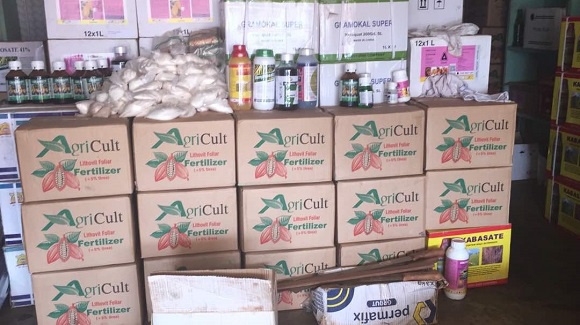Cocoa farmers and agro-chemical dealers in the Western region, according to checks, have huge stocks of Lithovit Foliar fertiliser which they say is being well-patronised by cocoa farmers due to its effectiveness.
Lithovit Foliar comprises ingredients which work well on cocoa. It contains Calcium Carbonate which releases Carbon Dioxide – a substrate for photosynthesis on cocoa. It also has primary nutrients like Nitrogen, Phosphorus and Potassium; and secondary nutrients like Calcium, Magnesium and Sulphur. Additionally, it has micronutrients like Iron, Boron and Zinc, giving it unique qualities from most fertilisers in the system.
The fertiliser, whose concentrates are blended by local firm AgriCult Company Limited, which, together with its MD, Seidu Agongo, and ex-CEO of the Ghana Cocoa Board (COCOBOD), Dr Stephen Opuni, is facing 27 charges of causing financial loss of GHS217 million to the state, is alleged by the state to be adulterated and hazardous.
However, several farmers are still using the product on their cocoa farms with reason that it increases their yield. Many agro-chemical shops also keep stocking Lithovit Foliar due to what they describe as its “high demand”.
For example, in Sefwi Bekwai in the Bibiani Anhwioso Bekwai district in the Western Region, Mr Eric Ansah, owner of Divine Vision Agro-Chemicals, who has been in the agro industry for the past eight years, and has been selling AgriCult’s Lithovit Foliar fertiliser for two years now, said the farmers testify to its efficacy and highly commend it for its effectiveness in increasing cocoa yield. “I have a set of farmers who will not go for any other liquid fertiliser unless it’s AgriCult’s Lithovit”, he told journalists, adding: “With AgriCult, I can be rest assured that my cocoa is safe”.
Also, Mr George Sey, owner of Perseverance Agro, Sefwi Dwenasi, said before becoming an agro dealer, “I was a full-time farmer. In actual fact, I started selling AgriCult’s Lithovit Foliar because of my personal experience with the product. I got only one bottle of the freely distributed consignment by government and applied it on a limited area in my farm. The result was remarkable. It works like magic. When you enter my farm, that portion looks different. I recommend it to all farmers”, he said.
In Tarkwa, an agro-chemical shop called Stevejoy, owned by one Madam Comfort Agyeiwaa Cudjoe, had huge stocks of the fertiliser. Lithovit Foliar, she noted, is in high demand because the farmers testify to its effectiveness as one of the best liquid fertilisers for growing cocoa. According to her, she sells 50 cartons of Lithovit Foliar every two weeks. Madam Comfort, who has been in the agro-chemical industry for the past 10 years, said she got to know of Lithovit Foliar through government’s free fertiliser policy and also via word-of-mouth testimonies of farmers.
Additionally, stocks of the agro-chemical were seen in a shop called All Is Well, located at Prestea. The shop owner, one Stephen Adu Gyamfi, confirmed the efficacy of the fertiliser on cocoa, especially in the dry season. He said the Cocoa Health Extension unit of COCOBOD did a good job educating cocoa farmers about its application for more yield. The farmers, he said, like using it because it is in liquid form, and, so, dissolves easily on the cocoa leaves even in the absence of rain when applied. He said the farmers fill their motorised spraying equipment with 30ml of the fertiliser and apply it on cocoa trees six times a year starting from May, with monthly intervals. According to him, the education provided by the Cocoa Health Extension unit of COCOBOD has been helping the farmers to get maximum yield.
Speaking to journalists, the Best Pollinated Farmer in Ghana, Mr Aduhene Frank, said all the cocoa farmers in the association he belongs to, known as Obaatampa, started seeing tremendous improvement in their farm yield when they started using AgriCult’s Lithovit Foliar fertiliser.
Also, Mr Ibraham Kofi Fofia, a 70-year-old cocoa farmer from Sefwi Dome, testified that throughout his decades of farming life and career, he has never seen any liquid fertiliser as effective as AgriCult’s Lithovit Foliar. Mr Fofia said he sees the fertiliser as the future for cocoa in Ghana.
At Juaboso, the owner of Sheick Adams Agro-Chemical shop, Adamu Abudu,s attested to the efficacy of Lithovit Foliar, saying: “A friend from Brong Ahafo first brought me two litres to try on my farm. I was reluctant to apply it because previous applications of such chemicals had not been helpful to my farm. After two months, I just felt like trying it. Master, you need pictures to believe how my farm has turned around. It really works”, he said.
At the Ghana-Cote d’Ivoire border town of Elubo, the owner of Big Joe Agro Services, Ezra Armoh Robert, said: “I was wondering why farmers always request for AgriCult anytime they visit my shop. Ever since I started selling AgriCult, sales for other liquid fertilisers had drop significantly. The farmers say AgriCult works wonders. One farmer tells me that he applied AgriCult three times and his farm has seen a great turnaround. On a daily basis, if 30 people visit my shop for fertilisers, you can be assured that 25 are in to buy AgriCult’s fertiliser”.
The testimonies of the agro-chemical sellers and farmers tie in with recent claims by Tamale Central MP, Inusah Fuseini that Lithovit Foliar is still on the market and being used by cocoa farmers who find it efficacious.
“The same product that they say has been adulterated is in the market, the farmers are buying it”, Mr Fuseini said on Multi TV’s news analysis programme Newsfile on Saturday, 17 March.

Meanwhile, a communicator of the main opposition National Democratic Congress (NDC), Sammy Gyamfi, in March 2018, revealed that the Cocoa Research Institute of Ghana (CRIG), on 22 January 2014, certified and recommended Lithovit Foliar to COCOBOD as an effective fertiliser for cultivating cocoa.
He told Adom TV’s BADWAM programme on Friday, 16 March that samples of the CRIG-certified fertiliser were taken to the Public Procurement Authority as part of processes to get the go-ahead for the supply to COCOBOD.
According to him, all the contractual and procurement processes started before the appointment of Dr Opuni by President John Mahama on 30 November 2013 as CEO of COCOBOD.
Mr Gyamfi said apart from the certification of the fertiliser by CRIG, field officers of the Cocoa Health and Extension Division of COCOBOD went on the ground to ascertain the effectiveness of Lithovit Foliar on the farms and returned with positive reports.
Also, the legal team for Dr Opuni and businessman Agongo, has argued that all the necessary tests were conducted on the fertiliser before it was supplied to farmers through three contracts between 2014 and 2016.
The contracts were GHS43.1million (2013/2014 cocoa farming season), GHS75.3million (2014/2015 cocoa farming season) and GHS98.9million (2015/2016 cocoa farming season) totalling GHS217million through sole-sourcing, the state claimed, adding that procurement procedures for sole-sourcing were not followed.
Mr Edudzi Tameklo, spokesperson for the team of lawyers, told Class91.5FM’s Executive Breakfast Show hosted by Moro Awudu on Tuesday, 27 March that: “A man, who, today is being alleged to have defrauded the state wrote to the Ministry of Food and Agriculture (MoFA) as early as 10th May 2013” to register his company and the company’s fertiliser product with the Ministry.
Mr Tameklo explained that Mr Agongo further wrote to the Deputy CEO of COCOBOD and the letter was received on the 13th of May 2013. It stated: “Submission of AgriCult fertiliser to CRIG for testing”.
On the 7th of June 2013, Mr Tameklo said MoFA wrote a letter to Mr Agongo stating: “I wish to confirm that the agricultural fertiliser has been approved by the Ministry of Food and Agriculture”.
The lawyer, thus, wondered how a man who wants to defraud the state, “will go to the very agency responsible for same” to certify all the processes he needed to have gone through before supplying the contract.
He further pointed out that as part of the certification and testing processes, the Plant Protection And Regulatory Services Directorate (PPRSD) of the Ministry of Agriculture stated in a letter to Mr Agongo that: “In compliance with the Plants and Fertiliser Act, you are notified that your fertiliser sample submitted to the fertiliser regulatory…has passed the laboratory test”.
Mr Agongo, he noted, went to the National Nuclear Research Institute for the testing of the product on 7th June, 2013.
Mr Tameklo emphasised that all these processes occurred “before Dr Opuni was appointed in November 2013 and started work in January 2014”.
“So, Alhaji Seidu Agongo had commenced the diligent testing of his product from one agency of the state to the other and in all those cases testing were done. To be diligent further, he went to the Cocoa Research Institute to have the product tested and the products were in fact tested. When the products were tested, on the 22nd day of January 2014, instructively, Dr F. M. Amoah of the Cocoa Research Institute, Executive Director, wrote to the Board of COCOBOD and it says: ‘This is to certify that the Cocoa Research Institute has tested and recommended to the Board Lithovit Foliar fertiliser’; that was for 2014,” Mr Tameklo noted.
According to the spokesperson for the defence team, “In 2015, the same agency recommended the product to COCOBOD. 2016, same certification was given”.
The Cocoa Health and Extension Office, he added, later conducted a research concerning the efficacy of the fertiliser after its usage on cocoa plants.
The office conducted a field test between the 7th and 25th April 2015 in the Brong Ahafo, Central, Eastern, Volta, Eastern North, Western South and Ashanti regions and their recommendation was positive based on the effectiveness of the fertiliser, he noted.
The report stated that: “On the basis of the field visits and observations made thereof, the following recommendations are made for the management’s favourable consideration. ‘Additionally, Foliar fertiliser, especially Lithovit, which farmers have shown preference for could be purchased to augment the 700,000litres purchased to ensure that all very young cocoa farms are fertilised so that the country could maximise its cocoa output’”.
The legal team said that particular report also stated that: “Some of the farmers who were met on the farm attested to the fact that there had been massive increases in cocoa yield due to the application of Lithovit liquid fertiliser”.
He said the state used all the fertiliser supplied by Mr Agongo and wondered how the man could now be accused of defrauding the state.
Attorney General Gloria Akuffo had told the court on Tuesday, 26 March that Mr Agongo, acting on behalf of AgriCult Ghana Limited, submitted to the Cocoa Research Institute of Ghana (CRIG), a fertiliser sample for testing. The testing was supposed to be in two phases: applied to seedlings and applied to mature plants for at least two planting seasons.
The AG said the testing was carried out for only the first phase after which a report recommending use of the Lithovit Foliar fertiliser was given without the second-phase testing.
Ms Akuffo argued that investigations revealed that Dr Opuni wrote to CRIG asking that they shorten the testing period. Dr Opuni, she said, subsequently wrote to Mr Agongo that his fertiliser had been certified for use on cocoa after which a certificate was issued by CRIG.
She said AgriCult, despite not applying for renewal of certificate for 2015 and 2016 as required, had its licence renewed upon the instance of Dr Opuni, without any testing.
Dr Opuni, then, according to Ms Akuffo, applied to the Public Procurement Authority for approval for AgriCult Ghana Limited to be single-sourced to procure 700,000 litres of the fertiliser, although conditions for single-sourcing had not been satisfied.
In that letter, Ms Akuffo said Dr Opuni stated the price as $19,250,000. She averred that the nature of the product was captured as liquid despite it being in powdery form.
The AG further told the court that as of the time of writing to the PPA, AgriCult had not written to COCOBOD stating any price as required by law.
The Public Procurement Authority then, she said, wrote to the COCOBOD boss requesting for value-for-money analysis.
Dr Opuni, Ms Akuffo continued, did not provide the value-for-money analysis but rather misrepresented the facts to the PPA that in compliance with advice from its Board in 2008, AgriCult Ghana Limited had been pre-qualified for the supply of the fertiliser, although, according to the AG, he knew this was not true.
She said based on Dr Opuni’s misrepresentation, the PPA Board approved COCOBOD’s request for the single-sourcing of 700,000 litres of the fertiliser.
In 2014, Dr Opuni, according to Ms Akuffo, once again wrote to the PPA requesting approval to hand AgriCult a contract to supply liquid fertiliser through sole-sourcing even though conditions had not been met.
The AG said the PPA approved this request and Dr Opuni then put in another request which was also approved.
In November 2015, the PPA, Ms Akuffo said, approved the application for single-source procurement.
She said three separate agreements were signed and executed by Mr Agongo’s AgriCult Ghana Limited.
Subsequent investigations, she said, had revealed that the contracts were executed when the company did not have a valid certificate to supply the fertiliser.
Whereas the material safety data sheet accompanying the fertiliser that was originally submitted to CRIG for testing described the substance as powdery, Dr Opuni, in requesting quotations for supply and delivery under the three contracts, referred to the fertiliser as liquid and quoted in litres, the AG said.
She continued that when the products arrived in Ghana, COCOBOD was required to notify CRIG for testing to ensure it corresponded with what was tested by CRIG but no such testing was done.
In 2017, she said COCOBOD carried out an audit into testing of fertilisers after which it referred the matter for criminal investigations. The investigations, the AG said, established that the product supplied by AgriCult Ghana Limited, was different from the sample submitted to CRIG for testing.
Further tests, she said, revealed variously that the fertiliser supplied had been adulterated and did not meet the specified standard and that the product could not be used as nutrient on cocoa. Furthermore, she added, the test indicated that the fertiliser could be harmful to humans and animals as well hazardous to water.
She said even though COCOBOD had spent $55million on the fertiliser, COCOBOD’s records showed there was no significant increase in the cocoa yield during the period.
Investigations, she stated, established that Mr Agongo deposited an amount of GHS25,000 into the account of Dr Opuni to influence the award of contracts.
Business News of Monday, 9 April 2018
Source: starrfmonline.com













